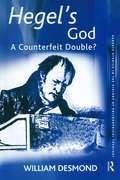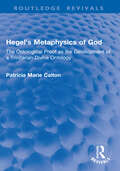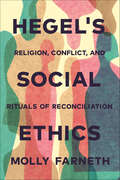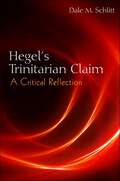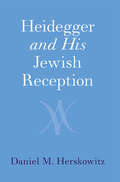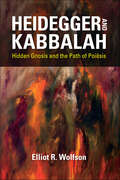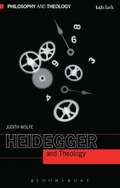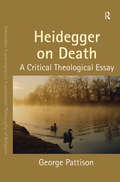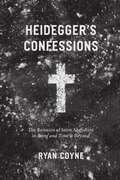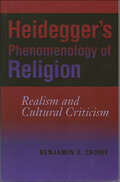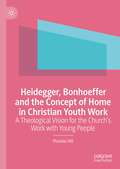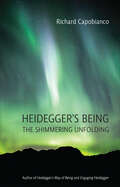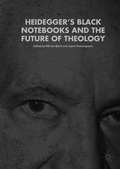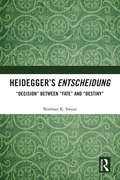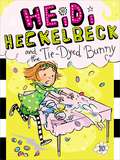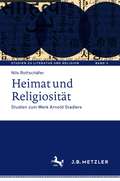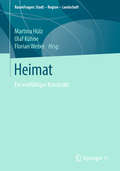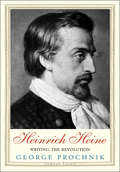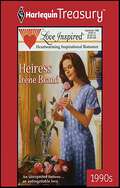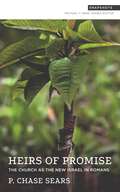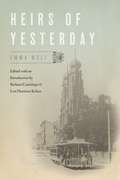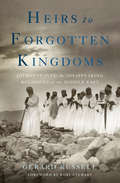- Table View
- List View
Hegel's God: A Counterfeit Double? (Ashgate Studies in the History of Philosophical Theology)
by William DesmondHegel is widely regarded as one of the major thinkers of the modern era, if not the entire tradition of philosophy. Hegel, like many philosophers, took seriously traditional philosophical perplexities about God, but unlike many modern philosophers he claimed to take the specific characteristic of Christianity into account in his philosophizing. This book presents a new examination, interpretation and critical engagement with Hegel's philosophy of religion, and with his concept of God in particular. William Desmond explores the distinctive stresses of Hegel's approach to God, the influence it has exerted, and the fundamental problems that his approach exhibits.
Hegel's Metaphysics of God: The Ontological Proof as the Development of a Trinitarian Divine Ontology (Routledge Revivals)
by Patricia Marie CaltonOriginally published in 2001, Hegel's Metaphysics of God presents Hegel's response to Kant's claim that metaphysics in general and, in particular, knowledge of God, is beyond the grasp of human knowledge. Calton argues that Hegel uses his version of the ontological proof not only to establish the existence of God, but also to develop a Trinitarian divine ontology. The book opens with a discussion of the traditional version of the ontological proof as it is set out by Anselm in his Proslogium and an analysis of the critiques of this traditional formulation of the proof offered by both Kant and Hegel. However, the main focus of the book concerns Hegel's reformulation of the ontological proof as a description of God's self-expression in the world and of God's attaining complete self-knowledge through human consciousness. Exploring Hegel’s proof as his description of God’s activity of self-expression and self-knowledge, Calton demonstrates that Hegel uses the ontological proof not only to establish that God exists, but also to articulate the Trinitarian structure of God, pointing to conclusions drawn by Hegel that human knowledge of God participates in the life of God by completing the Trinity. The book concludes by explaining the role played by human consciousness in completing the Trinity through the reasoning that takes place in the ontological proof. This book details the development of Hegel's argument for a Trinitarian metaphysics of God and establishes that the structure of Hegel's ontological proof encompasses Hegel's entire philosophical system, from the concept of God, to God’s self-expression in finitude, and, finally, to the recognition on the part of human consciousness that humans are an integral part of God’s being.
Hegel's Phenomenology of Spirit
by Ludwig Siep Daniel SmythHegel only published five books in his lifetime, and among them the Phenomenology of Spirit emerges as the most important but also perhaps the most difficult and complex. In this book Ludwig Siep follows the path from Hegel's early writings on religion, love and spirit to the milestones of his 'Jena period'. He shows how the themes of the Phenomenology first appeared in an earlier work, The Difference between Fichte's and Schelling's Systems of Philosophy, and closely examines the direction which Hegel's thought took as he attempted to think through the possibility of a complete system of philosophy. The themes encompassed by the Phenomenology – anti-dualistic epistemology, autonomy, historicality, the sociality of reason – are thoroughly discussed in Siep's subtle and elegantly argued assessment, which appears here in English for the first time. It will be of great interest to all readers studying Hegel's thought.
Hegel's Phenomenology of Spirit (Studies in Phenomenology & Existential Philosophy)
by Martin HeideggerThe text of Martin Heidegger's 1930-1931 lecture course on Hegel's Phenomenology of Spirit contains some of Heidegger's most crucial statements about temporality, ontological difference and dialectic, and being and time in Hegel. Within the context of Heidegger's project of reinterpreting Western thought through its central figures, Heidegger takes up a fundamental concern of Being and Time, "a dismantling of the history of ontology with the problematic of temporality as a clue." He shows that temporality is centrally involved in the movement of thinking called phenomenology of spirit.
Hegel's Social Ethics: Religion, Conflict, and Rituals of Reconciliation
by Molly FarnethHegel’s Social Ethics offers a fresh and accessible interpretation of G. W. F. Hegel’s most famous book, the Phenomenology of Spirit. Drawing on important recent work on the social dimensions of Hegel’s theory of knowledge, Molly Farneth shows how his account of how we know rests on his account of how we ought to live.Farneth argues that Hegel views conflict as an unavoidable part of living together, and that his social ethics involves relationships and social practices that allow people to cope with conflict and sustain hope for reconciliation. Communities create, contest, and transform their norms through these relationships and practices, and Hegel’s model for them are often the interactions and rituals of the members of religious communities.The book’s close readings reveal the ethical implications of Hegel’s discussions of slavery, Greek tragedy, early modern culture wars, and confession and forgiveness. The book also illuminates how contemporary democratic thought and practice can benefit from Hegelian insights.Through its sustained engagement with Hegel’s ideas about conflict and reconciliation, Hegel’s Social Ethics makes an important contribution to debates about how to live well with religious and ethical disagreement.
Hegel's Trinitarian Claim: A Critical Reflection
by Dale M. SchlittHegel's philosophical interpretation of Trinity as a dialectically developing movement of Spirit is one of the most profound readings of Trinity in Western thought. In Hegel's Trinitarian Claim, Dale M. Schlitt provides a careful, detailed presentation of this claim in Hegel's major published works and in his lectures on the philosophy of religion, taking a critical look at how Hegel presents his claim that to think of God as subject and person one must think of God as Trinity. Although agreeing with Hegel's conclusion, Schlitt argues on the basis of an immanent critique of Hegel's thought that Hegel is not able to defend that claim in the way in which he proposes to do so. Schlitt argues instead that Hegel's trinitarian claim can be justified when Spirit is no longer seen as a movement of thought but as a movement of enriching experience. This close analysis provides an excellent point of entry into the wider study and critical consideration of Hegel's systematic philosophical project as a whole. Originally published in 1984 and available now in paperback for the first time, this edition features a new preface and postscript.
Heidegger and His Jewish Reception
by Daniel M. HerskowitzIn this book, Daniel Herskowitz examines the rich, intense, and persistent Jewish engagement with one of the most important and controversial modern philosophers, Martin Heidegger. Contextualizing this encounter within wider intellectual, cultural, and political contexts, he outlines the main patterns and the diverse Jewish responses to Heidegger. Herskowitz shows that through a dialectic of attraction and repulsion, Jewish thinkers developed a version of Jewishness that sought to offer the way out of the overall crisis plaguing their world, which was embodied, as they saw it, in Heidegger's life and thought. Neither turning a blind eye to Heidegger's anti-Semitism nor using it as an excuse for ignoring his philosophy, they wrestled with his existential analytic and what they took to be its religious, ethical, and political failings. Ironically, Heidegger's thought proved itself to be fertile ground for re-conceptualizing what it means to be Jewish in the modern world.
Heidegger and Kabbalah: Hidden Gnosis and the Path of Poiesis (New Jewish Philosophy and Thought)
by Elliot R. WolfsonWhile many scholars have noted Martin Heidegger's indebtedness to Christian mystical sources, as well as his affinity with Taoism and Buddhism, Elliot R. Wolfson expands connections between Heidegger's thought and kabbalistic material. By arguing that the Jewish esoteric tradition impacted Heidegger, Wolfson presents an alternative way of understanding the history of Western philosophy. Wolfson's comparison between Heidegger and kabbalah sheds light on key concepts such as hermeneutics, temporality, language, and being and nothingness, while yielding surprising reflections on their common philosophical ground. Given Heidegger's involvement with National Socialism and his use of antisemitic language, these innovative readings are all the more remarkable for their juxtaposition of incongruent fields of discourse. Wolfson's entanglement with Heidegger and kabbalah not only enhances understandings of both but, more profoundly, serves as an ethical corrective to their respective ethnocentrism and essentialism. Wolfson masterfully illustrates the redemptive capacity of thought to illuminate common ground in seemingly disparate philosophical traditions.
Heidegger and Theology (Philosophy and Theology)
by Judith Wolfe Laurence Hemming<p>Martin Heidegger is the 20th century theology philosopher with the greatest importance to theology. A cradle Catholic originally intended for the priesthood, Heidegger's studies in philosophy led him to turn first to Protestantism and then to an atheistic philosophical method. Nevertheless, his writings remained deeply indebted to theological themes and sources, and the question of the nature of his relationship with theology has been a subject of discussion ever since. <p>This book offers theologians and philosophers alike a clear account of the directions and the potential of this debate. It explains Heidegger's key ideas, describes their development and analyses the role of theology in his major writings, including his lectures during the National Socialist era. It reviews the reception of Heidegger's thought both by theologians in his own day (particularly in Barth and his school as well as neo-Scholasticism) and more recently (particularly in French phenomenology), and concludes by offering directions for theology's possible future engagement with Heidegger's work.</p>
Heidegger on Death: A Critical Theological Essay (Intensities: Contemporary Continental Philosophy of Religion)
by George PattisonThis book examines the question of death in the light of Heidegger's paradigmatic discussion in Being and Time. Although Heidegger's own treatment deliberately refrains from engaging theological perspectives, George Pattison suggests that these not only serve to bring out problematic elements in his own approach but also point to the larger human or anthropological issues in play. Pattison reveals where and how Heidegger and theology part ways but also how Heidegger can helpfully challenge theology to rethink one of its own fundamental questions: human beings' relation to their death and the meaning of death in their religious lives.
Heidegger's Confessions: The Remains of Saint Augustine in "Being and Time" and Beyond (Religion And Postmodernism Ser.)
by Ryan CoyneAlthough Martin Heidegger is nearly as notorious as Friedrich Nietzsche for embracing the death of God, the philosopher himself acknowledged that Christianity accompanied him at every stage of his career. In Heidegger's Confessions, Ryan Coyne isolates a crucially important player in this story: Saint Augustine. Uncovering the significance of Saint Augustine in Heidegger’s philosophy, he details the complex and conflicted ways in which Heidegger paradoxically sought to define himself against the Christian tradition while at the same time making use of its resources. Coyne first examines the role of Augustine in Heidegger’s early period and the development of his magnum opus, Being and Time. He then goes on to show that Heidegger owed an abiding debt to Augustine even following his own rise as a secular philosopher, tracing his early encounters with theological texts through to his late thoughts and writings. Bringing a fresh and unexpected perspective to bear on Heidegger’s profoundly influential critique of modern metaphysics, Coyne traces a larger lineage between religious and theological discourse and continental philosophy.
Heidegger's Phenomenology of Religion: Realism and Cultural Criticism (Philosophy of Religion)
by Benjamin D. CroweThroughout his long and controversial career, Martin Heidegger developed a substantial contribution to the phenomenology of religion. In Heidegger's Phenomenology of Religion, Benjamin D. Crowe examines the key concepts and developmental phases that characterized Heidegger's work. Crowe shows that Heidegger's account of the meaning and structure of religious life belongs to his larger project of exposing and criticizing the fundamental assumptions of late modern culture. He reveals Heidegger as a realist through careful readings of his views on religious attitudes and activities. Crowe challenges interpretations of Heidegger's early efforts in the phenomenology of religion and later writings on religion, including discussions of Greek religion and Hölderlin's poetry. This book is sure to spark discussion and debate as Heidegger's work in religion and the philosophy of religion becomes increasingly important to scholars and beyond.
Heidegger, Bonhoeffer and the Concept of Home in Christian Youth Work: A Theological Vision for the Church's Work with Young People
by Phoebe HillThis book explores what it means to be and become-at-home in theological perspective, located in the context of a youth club. Drawing on ethnographic research, Phoebe Hill presents an account of what an authentic Christian hospitality could look like in a youth setting, and the ways in which the young people – the strangers at the door – might enable the Christian youth worker to become more fully at home. Discourses around Christian hospitality often unwittingly perpetuate implicit power imbalances. The youth club offers a context for Christian hospitality that ‘tips’ the power in favour of the young people who attend, enabling the youth leaders to share and create home with young people in a distinctive way. As young people leave the Church in droves, the Church faces the urgent and daunting task of finding new ways of being with young people on their own terms; this book offers one solution. Hill argues that homecoming is an essential task of humanity. We are connected in this common pilgrimage and the need to find places and spaces where we can be at home. Becoming at home may be harder than ever before; numerous sociological, philosophical and theological factors are compromising our ability to dwell in the contemporary world.
Heidegger’s Being: The Shimmering Unfolding (New Studies in Phenomenology and Hermeneutics)
by Richard CapobiancoIn Heidegger’s Being: The Shimmering Unfolding, the eminent Heidegger scholar Richard Capobianco draws on many new texts and sources to highlight in fresh ways the beauty and spiritual resonance of Martin Heidegger’s thinking about Being. As in his earlier books, Capobianco offers a meditative path through Heidegger’s thought. He illuminates major motifs that are overlooked or set aside by most contemporary readings of Heidegger, amplifying these motifs in an original, heartfelt, and eloquent way. The book also offers a series of reflections that bring Heidegger’s thinking into close proximity to other thinkers and poets, including Alfred North Whitehead, C.G. Jung, Robert Frost, Walt Whitman, and Rumi. Heidegger’s Being: The Shimmering Unfolding is intended not only for dedicated students of Heidegger’s work but also for engaged general readers who wish to come to a deeper appreciation of his distinctive vision of Being.
Heidegger’s Black Notebooks and the Future of Theology
by Jayne Svenungsson Mårten BjörkThis book probes the relationship between Martin Heidegger and theology in light of the discovery of his Black Notebooks, which reveal that his privately held Antisemitism and anti-Christian sentiments were profoundly intertwined with his philosophical ideas. Heidegger himself was deeply influenced by both Catholic and Protestant theology. This prompts the question as to what extent Christian anti-Jewish motifs shaped Heidegger's own thinking in the first place. A second question concerns modern theology's intellectual indebtedness to Heidegger. In this volume, an array of renowned Heidegger scholars - both philosophers and theologians -investigate Heidegger's animosity toward the biblical legacy in both its Jewish and Christian interpretations, and what it means for the future task and identity of theology.
Heidegger’s Entscheidung: “Decision” Between “Fate” and “Destiny”
by Norman K. SwazoThis book critically examines the debate on Martin Heidegger’s concept of Entscheidung ("decision") and his engagement and confrontation with Nazism in terms of his broader philosophical thought. It argues that one cannot explain Heidegger’s actions without accounting for his idea of "decision" and its connection to his understanding of individual "fate" and national (and European) "destiny." The book looks at the relation of biography to philosophy and the ethical and political implications of appropriating Heidegger’s thinking in these domains of inquiry. It highlights themes such as Heidegger’s differences with the neo-Kantians in Germany; Heidegger on Kant and practical reason; and his reading of Nietzsche and Hegel. It offers a philosophical assessment grounded in Heidegger’s own texts, with reference to historical and other philosophical commentaries on the rise of National Socialism in post-Weimar Germany and the philosophical issues associated with the interpretation of Nazi genocide and ideology. An important intervention in Western philosophy, this book will be of great interest to scholars and researchers of political philosophy, continental philosophy, German philosophy, philosophy in general, and political studies.
Heidi Heckelbeck and the Tie-Dyed Bunny: Heidi Heckelbeck And The Christmas Surprise; Heidi Heckelbeck And The Tie-dyed Bunny; Heidi Heckelbeck Is A Flower Girl; Heidi Heckelbeck Gets The Sniffles (Heidi Heckelbeck #10)
by Wanda CovenHeidi brings home the class bunny over Easter weekend—and finds herself in a magical, colorful mess!Easter is just a few days away and Heidi Heckelbeck can’t wait! The holiday weekend is even more special because it’s Heidi’s turn to take home Maggie, the school’s bunny. But when Heidi takes Maggie out of her cage, trouble follows. Maggie escapes from Heidi’s arms and runs through all of the Easter egg dye! Will Heidi figure out how to un-tie-dye the colorful bunny before she has to take her back to school? With easy-to-read language and illustrations on almost every page, the Heidi Heckelbeck chapter books are perfect for beginning readers.
Heimat und Religiosität: Studien zum Werk Arnold Stadlers (Studien zu Literatur und Religion / Studies on Literature and Religion #3)
by Nils RottschäferDas Werk Arnold Stadlers, das sich aus der lebendigen Sprache, aus dem Konkreten und Ambivalenten der heimatlichen Lebenswelt speist, hat Teil an dem Diskurs über Zugehörigkeit, über Angekommen- und Angenommen-Sein in einer globalisierten Welt. ‚Heimat‘ und ‚Religiosität‘ bilden die strukturbildenden Komplexe seines hochreflektierten Werks, die hier in ihrer Bezogenheit aufeinander gedeutet werden. Die Engführung beider Phänomene, nach der sich die literarischen Figuren Stadlers sehnen, fungiert als grundlegendes poetisches Prinzip der Texte. Auch die Religion kann zu einer erfahrbaren sozialen Heimat werden, die Heimat kann ebenso religiöse Züge annehmen.
Heimat: Ein vielfältiges Konstrukt (RaumFragen: Stadt – Region – Landschaft)
by Olaf Kühne Florian Weber Martina HülzDie politischen und gesellschaftlichen Diskussionen um Heimat intensivieren sich. Im Kontext des Versuchs der Selbstvergewisserung im Zuge der Globalisierung, aber auch der Differenzierung und Fragmentierung der Gesellschaft, der Einwanderung sowie landschaftlichen Wandlungsprozessen nehmen die Kämpfe um Deutungshoheit um das Heimatliche und das Nicht-Heimatliche an Schärfe zu. Mit dem Band ‚Heimat. Ein vielfältiges Konstrukt‘ soll ein Beitrag eigens aus raum-, politik- und medienwissenschaftlichen sowie soziologischen Perspektiven zur Klärung und Einordnung unterschiedlicher Positionen im Kontext des ‚umkämpften Feldes Heimat‘ geleistet werden.
Heinrich Heine: Writing the Revolution (Jewish Lives)
by George ProchnikA thematically rich, provocative, and lyrical study of one of Germany’s most important, world-famous, and imaginative writers Heinrich Heine (1797–1856) was a virtuoso German poet, satirist, and visionary humanist whose dynamic life story and strikingly original writing are ripe for rediscovery. In this vividly imagined exploration of Heine’s life and work, George Prochnik contextualizes Heine’s biography within the different revolutionary political, literary, and philosophical movements of his age. He also explores the insights Heine offers contemporary readers into issues of social justice, exile, and the role of art in nurturing a more equitable society. Heine wrote that in his youth he resembled “a large newspaper of which the upper half contained the present, each day with its news and debates, while in the lower half, in a succession of dreams, the poetic past was recorded fantastically like a series of feuilletons.” This book explores the many dualities of Heine’s nature, bringing to life a fully dimensional character while also casting into sharp relief the reasons his writing and personal story matter urgently today.
Heiress
by Irene BrandHER LIFE CHANGED OVERNIGHT....Unbelievable...but true! Allison Sayre woke one day to learn she was a millionaire. Yet Allison never dreamed that her legacy would include a shocking secret about her own identity. Or a reunion with Benton Lockhart, the man whose powerful spiritual convictions had inspired her faith.But Allison knew that all the money in the world could never soothe Benton's troubled soul-or heal his battered spirit. She prayed to understand the meaning of her new life-and to find a way to touch Benton's heart.
Heirs of Promise: The Church as the New Israel in Romans (Snapshots)
by P. Chase SearsHow did the Apostle Paul view the Church? And where does Israel fit in? How are the promises to Israel fulfilled? In Heirs of Promise, P. Chase Sears discusses this relationship between the Church and Israel, and he explains how that affects our understanding of the Old Testament. Using a biblical-theological approach to the book of Romans, Sears argues that Paul understood the church not as a replacement of Israel, but as the new Israel--the continuation of Israel reconstituted in Christ. And Jesus, as the Son of God, is the true Israel who fulfills all of God's purposes for Israel and creation. Sears shows how the Old Testament promises to Israel are being fulfilled in the Church.
Heirs of Yesterday
by Barbara Cantalupo Lori Harrison-KahanOriginally published in 1900 and set in fin-de-siècle California, Heirs of Yesterday by Emma Wolf (1865–1932) uses a love story to explore topics such as familial loyalty, the conflict between American individualism and ethno-religious heritage, and anti-Semitism in the United States. The introduction, co-authored by Barbara Cantalupo and Lori Harrison-Kahan, includes biographical background on Wolf based on new research and explores key literary, historical, and religious contexts for Heirs of Yesterday. It incorporates background on the rise of Reform Judaism and the late nineteenth-century Jewish community in San Francisco, while also considering Wolf’s relationship to the broader literary movement of realism and to other writers of her time. As Cantalupo and Harrison-Kahan demonstrate, the publication history and reception of Heirs of Yesterday illuminate competing notions of Jewish American identity at the turn of the twentieth century. Compared to the familiar ghetto tales penned by Yiddish-speaking, Eastern European immigrant writers, Heirs of Yesterday offers a very different narrative about turn-of-the-twentieth-century Jewish life in the United States. The novel’s central characters, physician Philip May and pianist Jean Willard, are not striving immigrants in the process of learning English and becoming American. Instead, they are native-born citizens who live in the middle-class community of San Francisco’s Pacific Heights, where they interact socially and professionally with their gentile peers. Tailored for students, scholars, and readers of women’s studies, Jewish studies, and American literature and history, this new edition of Heirs of Yesterday highlights the art, historical value, and controversial nature of Wolf’s work.
Heirs to Forgotten Kingdoms
by Gerard RussellDespite its reputation for religious intolerance, the Middle East has long sheltered many distinctive and strange faiths: one regards the Greek prophets as incarnations of God, another reveres Lucifer in the form of a peacock, and yet another believes that their followers are reincarnated beings who have existed in various forms for thousands of years. These religions represent the last vestiges of the magnificent civilizations in ancient history: Persia, Babylon, Egypt in the time of the Pharaohs. Their followers have learned how to survive foreign attacks and the perils of assimilation. But today, with the Middle East in turmoil, they face greater challenges than ever before. In Heirs to Forgotten Kingdoms, former diplomat Gerard Russell ventures to the distant, nearly impassable regions where these mysterious religions still cling to survival. He lives alongside the Mandaeans and Ezidis of Iraq, the Zoroastrians of Iran, the Copts of Egypt, and others. He learns their histories, participates in their rituals, and comes to understand the threats to their communities. Historically a tolerant faith, Islam has, since the early 20th century, witnessed the rise of militant, extremist sects. This development, along with the rippling effects of Western invasion, now pose existential threats to these minority faiths. And as more and more of their youth flee to the West in search of greater freedoms and job prospects, these religions face the dire possibility of extinction. Drawing on his extensive travels and archival research, Russell provides an essential record of the past, present, and perilous future of these remarkable religions.
Heirs to Forgotten Kingdoms
by Gerard RussellDespite its reputation for religious intolerance, the Middle East has long sheltered many distinctive and strange faiths: one regards the Greek prophets as incarnations of God, another reveres Lucifer in the form of a peacock, and yet another believes that their followers are reincarnated beings who have existed in various forms for thousands of years. These religions represent the last vestiges of the magnificent civilizations in ancient history: Persia, Babylon, Egypt in the time of the Pharaohs. Their followers have learned how to survive foreign attacks and the perils of assimilation. But today, with the Middle East in turmoil, they face greater challenges than ever before. In Heirs to Forgotten Kingdoms, former diplomat Gerard Russell ventures to the distant, nearly impassable regions where these mysterious religions still cling to survival. He lives alongside the Mandaeans and Ezidis of Iraq, the Zoroastrians of Iran, the Copts of Egypt, and others. He learns their histories, participates in their rituals, and comes to understand the threats to their communities. Historically a tolerant faith, Islam has, since the early 20th century, witnessed the rise of militant, extremist sects. This development, along with the rippling effects of Western invasion, now pose existential threats to these minority faiths. And as more and more of their youth flee to the West in search of greater freedoms and job prospects, these religions face the dire possibility of extinction. Drawing on his extensive travels and archival research, Russell provides an essential record of the past, present, and perilous future of these remarkable religions.
